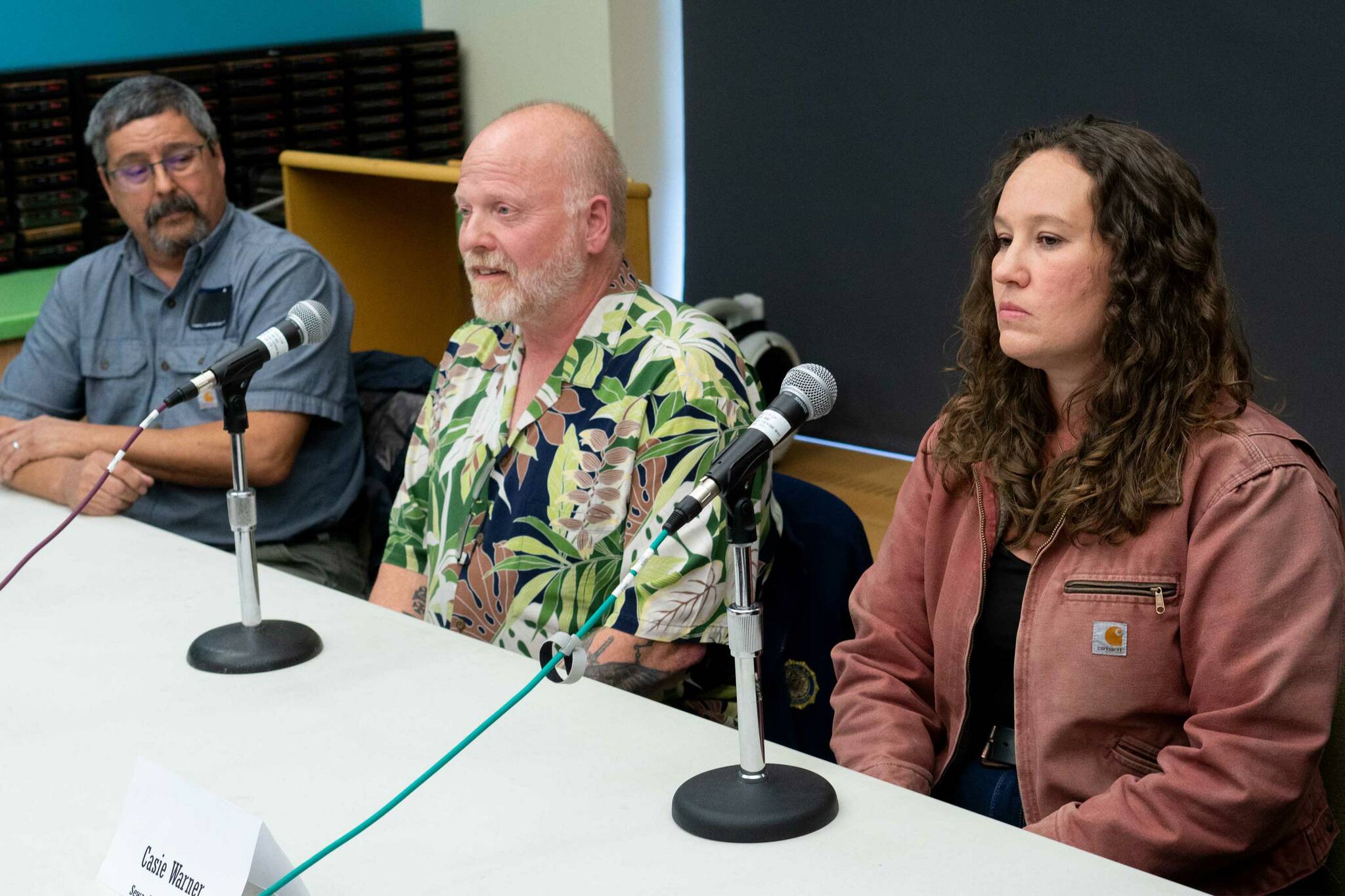At a candidate forum moderated by the Peninsula Clarion and KBBI 890 AM on Thursday, three of the four candidates running for the two open spots on the Seward City Council this year met to discuss their visions for Seward’s future.
On election day, Oct. 1, Seward voters will cast ballots in favor of up to two candidates — the top two vote-getters will claim the two open seats for three-year terms expiring in October 2027.
The incumbents are Vice Mayor John Osenga and council member Mike Calhoon. Both are seeking reelection, and both attended the forum. Challenger Casie Warner also participated, though fellow challenger John Howard was unable to attend.
Osenga said he’s seeking reelection to continue following and working on the projects that he’s focused on during his last term.
“I would like to keep Seward moving forward in a fashion that is productive,” he said.
Calhoon spoke similarly, saying that he wants to continue work on key programs, projects and issues. He cited the budget, a housing shortage in the city and maintenance and repair of key infrastructure as being at the top of his mind.
“I’m enjoying what we’re doing,” he said. “There’s some important things to work on.”
Warner described herself as a lifelong Seward resident and a graduate of Seward High School, seeking a seat on the Seward council to bring passion for the community and its families into the public sphere. She said that she’s worked in private and nonprofit industry to promote child care and housing in the city, and characterized her campaign for city council as “the next step.”
All three said that, after Seward voters decided last year not to sell the city’s electric utility by a margin of seven votes, their voices have been heard. Each of the candidates said that the council’s responsibility, now, is making Seward Electric the best utility it can be.
Candidates also broadly agreed that the city needs to take further steps to develop its year-round economy. Calhoon said that the city can do this by making Seward an easier and less expensive place to do business, but that he wants to see Seward maintain its identity and beauty at the same time. Warner and Osenga both pointed to the city’s housing shortage as the greatest obstacle to business development.
On the topic of housing, Warner said she wants to see the city partner with organizations around the state that are supporting and developing year-round affordable housing. Osenga said the city should pursue policies “favorable to the development of housing.” Calhoon looked to the city’s Developer Reimbursement Program as a success that’s led to active development of three properties.
Calhoon said the city is already looking at expansion of its water and sewer utilities to lots in the city where they aren’t already available.
“If we can work on getting those lots more buildable and accessible, that’s going to help,” he said. “As we try to solve the housing problem that we have.”
While candidates agreed that there was more to do on housing, child care split the group. Osenga and Calhoon said that recent efforts by the city to promote development of child care infrastructure have been successful, and they would now rely on private industry to continue carrying the child care conversation forward. Warner — who is the program director for HYPER, a parent resource group that’s played a large role in tackling child care issues in the city — said “there is space” to continue partnering with organizations and taking action to develop child care.
Other issues, like the housing shortage, Warner said, exacerbate the challenges with providing enough child care. Child care is also, she said, “not a high revenue business.”
“We really need to support individuals that are interested in starting up their own business within their home,” she said. “We have people that want to be child care providers, but they don’t have a home.”
Discussing large capital projects, like the stalled 2022 effort to build a community recreation center in Seward, the candidates all said the city’s priorities need to be on key maintenance of existing infrastructure. Specifically, they cited Seward’s public works building and public safety facilities.
The candidates also agreed that they were supportive of Seward’s bed tax. Calhoon, a former bed and breakfast owner, and Warner, who said she operates three short-term rentals in the city, said they haven’t seen the tax affect their finances — instead that it’s passed on to visitors.
Osenga and Calhoon both said that supporting arts and culture in Seward is important, but that there are other organizations doing a good job of promoting and growing the scene. The city, Osenga said, likely doesn’t have a large role to play.
Warner said that the city council can provide “leadership,” and take steps “within means to continue to support the arts in our community.”
Looking to the future, each candidate said they want to see Seward with a successful and robust year-round economy.
A full recording of the forum can be found on the Peninsula Clarion’s Facebook page or listened to as a podcast at kbbi.org.
Reach reporter Jake Dye at jacob.dye@peninsulaclarion.com.


